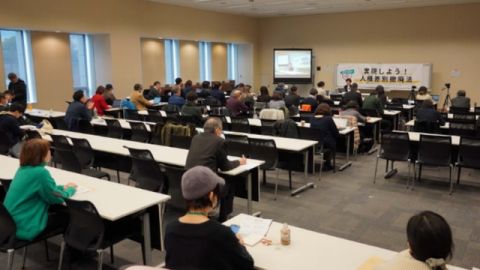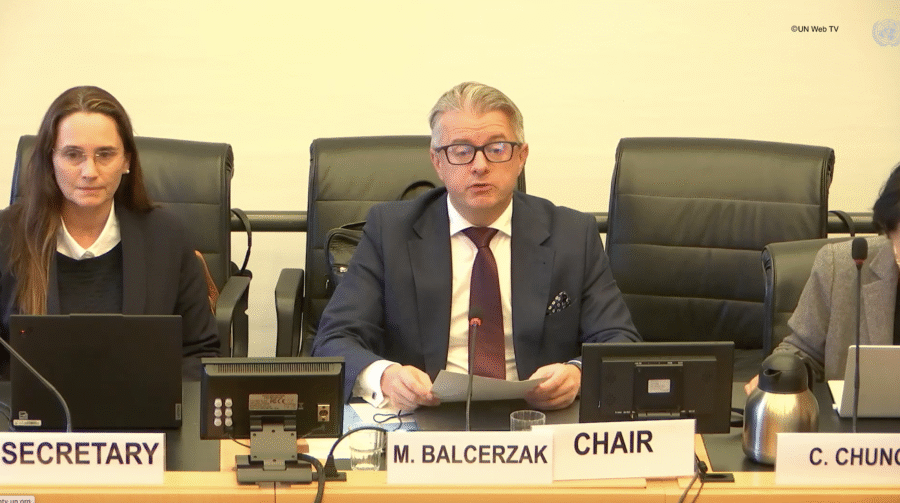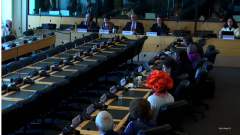【Event Recap】Act Now! Time to adopt anti-discrimination law in Japan
March 26, 2025

To celebrate the International Day for the Elimination of Racial Discrimination (21 March), IMADR and the Japan NGO Network for the Elimination of Racial Discrimination (ERD-Net) organised the event on 19 March 2025. Approximately 100 people participated, including the general public, members of Parliament and the media.

(Photo: “Act Now! Time to adopt anti-discrimination law in Japan”)
ICERD and Japan
In 1995, Japan acceded to ICERD under the following conditions:
- Without adjusting the domestic legal framework as to support the implementation of the Convention
- With reservation to Article 4 (a) and (b) on the prohibition of hate speech
- Without declaring its acceptance of the competence of CERD in regard to individual communications under Article 14
- Without recognising that discrimination against Buraku and Ryukyu falls under the scope of the definition of racial discrimination under Art. 1 of the Convention.
As of March 2025, the CERD has reviewed the reports of the Government of Japan four times, i.e. in 2001, 2010, 2014, and 2018. And, the Committee repeatedly recommended the Government to among others, 1) adopt a comprehensive anti-racial discrimination law, 2) establish a National Human Rights Institution, 3) consider withdrawing its reservation on article 4 (a)(b) and appropriately address hate speech, 4) declare its acceptance under Article 14, 5) recognise that “descent” based discrimination includes Buraku discrimination, 6) recognise Ryukyu/Okinawa people as indigenous peoples, 7) ensure children’s right to education at Korean schools, and 8) ensure the right for non-citizens to access certain public services and the right to work as public servants.
\It is time for Japan, as a state party for 30 years, to take decisive actions towards the elimination of racial discrimination! /
Racial Discrimination in Japan – Voices from the Ground
- Continued Buraku discrimination
Buraku discrimination continues to occur. Moreover, there are relentless outings of Buaku individuals and their neighbourhoods on the Internet, which infringes upon their right not to be discriminated against and the right to privacy. Against this backdrop, it is necessary to 1) revise the Act on the Promotion of the Elimination of Buraku Discrimination (2016) and 2) adopt ordinances to eliminate Burau discrimination at local levels. It is urgently needed to address Buraku discrimination effectively and appropriately.
- Discrimination faced by Ainu Indigenous women
Ainu Indigenous women have been suffering from intersecting forms of discrimination and are more vulnerable to hate speech repeatedly made by public figures and their supporters. Japanese schools do not teach human rights. Thus, human rights are misunderstood as sympathy rather than rights everyone has. Also, the government does not fulfil its responsibilities as a duty bearer. Immediate establishment of a National Human Rights Institution is called for.
- Discriminatory practices towards Korean schools
For diplomatic and political reasons, Korean schools have been excluded from the government’s High School Tuition Support Fund since it started in 2010. “No matter where we are born, we desire to live with pride in our cultural roots. We keep fighting for the right to education. We urge the government to revise its position and to allow Korean schools to benefit from the Fund and so forth.” (From a letter that students at a Korean high school sent to the Ministry of Education, Culture, Sports, Science and Technology).
- Systemic discrimination against Zainichi Korean
San Francisco Peace Treaty of 1950 deprived Japanese nationality of Koreans then living in Japan unexceptionally. Under the present Japanese nationality law, parents’ nationality determines whether their children are eligible to exercise the right to vote, the right to work as public servants and some other social and political rights. Such a social system discriminates people based on race and allows significant inequalities in legal status solely on the basis of lineage. Immediate adoption of a comprehensive anti-discrimination law in line with ICERD is needed.
- The Bill Amending the Immigration Control and Refugee Recognition Act
Despite strong opposition from the civil society, the bill to amend the Immigration Control and Refugee Recognition Act was passed and is to enter into force in three years. This bill negatively impacts non-citizens with permanent resident status by broadening the grounds for revocations. We provided information under CERD’s early warning and urgent action procedures, and the Committee sent the letter of inquiries to the Government.
- Hate speech against Kurds living in Japan
Since 2023, there has been increasing hate speech against Kurds, especially on SNS. A recent example is that a discourse is spreading on the internet, blaming the Kurds for the sharp rise in rice prices. We call on the members of parliament and civil society to take immediate actions against hate speech. We also call for the adoption of an anti-racial discrimination law so that hate speech can be controlled.
What actions should be taken?
The Government of Japan should adopt legislation on the elimination of racial discrimination in all areas of life that can appropriately punish and sanction perpetrators. It is time for the Government to accelerate its efforts to eliminate racial discrimination.
Messages of Solidarity
Messages of Solidarity were received from Patrick Thornberry (former expert of CERD, Emeritus Professor of Keele University), Masanao Murakami (Professor of Nara University), Claude Cahn (Human Rights Officer at OHCHR), and Korean Migrants’ Rights Coalition for the Enactment of the Anti-Discrimination Law
.





